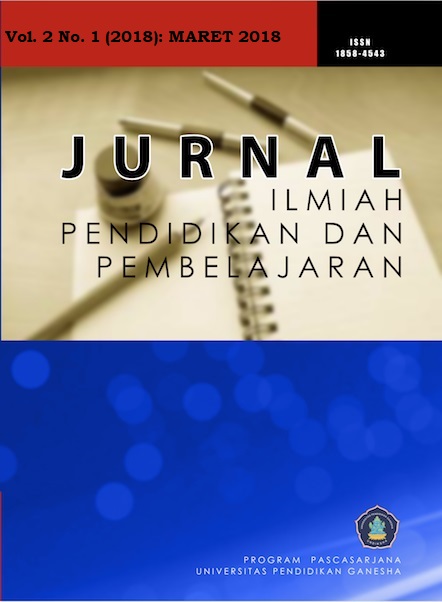PENERAPAN MODEL PROBLEM BASED LEARNING BERBANTU MEDIA AUDIO VISUAL UNTUK MENINGKATKAN BERPIKIR KRITIS KELAS 4 SD
DOI:
https://doi.org/10.23887/jipp.v2i1.13870Abstract
This type of research is a class action research. The purpose of this research enhances students ' critical thinking ability by application of Problem Based Learning with Audio Visual Media. Data were collected by using a sheet of observation and evaluation tests. The average percentage of critical thinking ability of students overall observation sheet on precyae 13.8% increase in cycle cycle I 69% and increased again in cycle II 96.5%. And the overall percentage on the test results the evaluation cycle I 44.8% increase in cycle II 96.6%. Thus the results showed that the application of problem based learning with audio visual media is able to enhance the critical thinking ability of students.
References
Arikunto , S. (2013). Prosedur Penelitian Suatu Pendekatan Praktik. Jakarta: PT Rineka Cipta.
Christina, L. V., & Kristini, F. (2016). Efektifitas Model Pembelajaran Tipe Group Investigation (GI) dan Cooperatif Integrated Reading And Composition (CIRC) dalam Meningkatkan Kreativitas Berpikir Kritis dan Hasil Belajar IPS Siswa Kelas 4. Sholaria: Jurnal pendidikan dan kebudayaan, 6(2), 217-230.
Faiz, F. (2012). Thingking Skill, pengantar menuju berpikir kritis. Yogyakarta: SUKA-Press.
Fakhriyah, F. (2014). Penerapan Model Problem Based Learning dalam Upaya Mengembangkan Kemampuan Berpikir Kritis Mahasiswa. Jurnal Pendidikan IPA Indonesia, 3(1), 95-101.
Kustandi, Cecep, & Sutjipto, B. (2013). Media Pembelajaran Manual dan Digital. Jakarta: Ghalia Indonesia.
Nopia, R., Julia, & Sujana, A. (2016). Pengaruh Model Problem Based Learning Terhadap Ketrampilan Berpikir Kritis Siswa Sekolah Dasar Pada Materi Daur Air. Jurnal Pena Ilmiah, 1, No.1, 641-650.
Puspita, V., & Yuhelman, N. (2017, April). Peningkatan Proses Pembelajaran Tematik dengan Menggunakan Pendekatan Problem Based Learning di Kelas III SD. Pendidikan dan Keguruan, VIII No.1.
Rahmadani, N., & Anugraheni, I. (2017). Peningkatan Aktivitas Belajar Matematika melalui Problem Based Learning Bagi Siswa Kelas 4 SD. Sholaria: Jurnal Pendidikan dan Kebudayaan, 7(3), 241-250.
Rahmawati , A., & Hizqiyah , I. N. (2017, Juni). Implementasi Model Pembelajaran Problem Based Learning untuk Meningkatkan Penguasaan Defisiensi Nutrisi Tumbuhan pada Mahasiswa Pendidikan Biologi Universitas Pasundan. J. Bio & Pend.Bio, 2, No.1, 21-25.
Redhana, I. W. (2012, November). Model Pembelajaran Berbasis Masalah dan Pertanyaan Sockratik untuk Meningkatkan Ketrampilan Berpikir Kritis Siswa. Cakrawala pendidikan, XXXI, No.3.
Rusyna, A. (2014). Ketrampilan berpikir. Yogyakarta: Ombak.
Saputra, A. T. (2015). Peningkatan Kemampuan Berpikir Kritis Menggunakan Model Problem Based Learning (PBL) pada Pembelajaran Tematik Terpadu di Sekolah Dasar. e-Jurnal Inovasi Pembelajaran SD, 1, 1-16.
Sidi, J., & Mukminan. (2016, Juni). Penggunaan Media Audiovisual untuk Meningkatkan Hasil belajar IPS di SMP. Socia, 15. No.1, 52-72.
Suparno, & Iranto, D. (2014, Oktober). The Effect of PBL Method Using The Hypermedia to The Student' Critical Thinking Skill on The Social Studies Subject. Jurnal Pendidikan Ekonomi dan Bisnis (JPEB), 2 No.2, 40-52.
Syaribuddin, Ibnu Khaldun, & Musri . (n.d.). Penerapan Model Pembelajaran Problem Based Learning (PBL) dengan Media Audio Visual pada Materi Ikatan Kimia Terhadap Penguasaan Konsep dan Berpikir Kritis Peserta Didik Sma Negeri 1 Panga. Jurnal Pendidikan Sains Indonesia, Vol. 04, No.02, hlm 96-105, 2016 .
Virgiana, A., & Wasitohadi, W. (2016). Efektifitas Model Problem Based Learning Berbantu Media Audio Visual Ditinjau dari Hasil Belajar IPA Siswa Kelas 5 SDN Gadu Ambong-Blora Semester 2 Tahun 2014/2015. Scholaria: Jurnal Pendidikan dan Kebudayaan, 6 (2), 100-118.
Zakiyah, S., Suryandari, K. C., & Wahyudi. (2017). Peningkatan Ketrampilan Berpikir Kritis Melalui Model Pembelajaran Problem Based Learning (PBL) pada Pembelajaran IPA Tentang Gaya Siswa kelas V SD Negeri 1 Gebangsari Tahun ajaran 2016/2017. KALAM CENDEKIA, 5, No.3, 231-237.
Downloads
Published
How to Cite
Issue
Section
License
Authors who publish with the Jurnal Ilmiah Pendidikan dan Pembelajaran (JIPP) agree to the following terms:
- Authors retain copyright and grant the journal the right of first publication with the work simultaneously licensed under a Creative Commons Attribution License (CC BY-SA 4.0) that allows others to share the work with an acknowledgment of the work's authorship and initial publication in this journal.
- Authors are able to enter into separate, additional contractual arrangements for the non-exclusive distribution of the journal's published version of the work (e.g., post it to an institutional repository or publish it in a book), with an acknowledgment of its initial publication in this journal.
- Authors are permitted and encouraged to post their work online (e.g., in institutional repositories or on their website) prior to and during the submission process, as it can lead to productive exchanges, as well as earlier and greater citation of published work. (See The Effect of Open Access)










